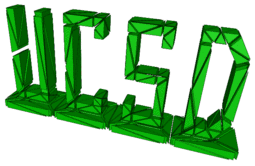| Michael Holst | ||
| https://ccom.ucsd.edu/~mholst/ |
Distinguished Professor of Mathematics and Physics UC San Diego |
|
|
Math 270C (Numerical Mathematics)
Course Topics: Approximation theory and
numerical methods for ODEs Instructor: Prof. Michael Holst (5739 AP&M, mholst@math.ucsd.edu; Office Hours: MW 1-2pm) Term: Spring 2005 Lecture: 12:00a-12:50a MWF, APM 7218 Textbook(s): E. Isaacson and H.B. Keller, Analysis of Numerical Methods, Dover, New York, NY. Main Class Webpage: http://ccom.ucsd.edu/~mholst/teaching/ucsd/270c_s05/index.html CATALOG DESCRIPTION: 270A-B-C. Numerical Mathematics (4-4-4) Error analysis of the numerical solution of linear equations and least squares problems for the full rank and rank deficient cases. Error analysis of numerical methods for eigenvalue problems and singular value problems. Error analysis of numerical quadrature and of the numerical solution of ordinary differential equations. Three lectures. Prerequisites: Math. 20F and knowledge of programming. COURSE INFORMATION: Many of the advances of modern science have been made possible only through the sophisticated use of computer modeling. The mathematical foundation of the computer modeling techniques now used in all areas of mathematics, engineering, and science is known as numerical analysis (sometimes referred to as computational mathematics, numerical mathematics, or scientific computing). The Math 270ABC series at UCSD provides a graduate level overview of some of the foundation topics in numerical analysis. Roughly speaking, Math 270A dealt with various aspects of numerical linear algebra, and Math 270B focused on numerical methods for solving nonlinear equations and optimization problems. Math 270C deals primarily with classical and modern approximation theory as needed for analyzing numerical methods, with application to the numerical solution of initial (IVPs) and boundary value problems (BVPs) in ordinary differential equations (ODEs). While 270A and 270B may be viewed as preparation for Math 271ABC (numerical optimization), 270C (with some topics from 270B) is essentially preparation for 272ABC (numerical PDE) and 273ABC (computational and applied mathematics). Our schedule in Math 270C will be roughly as follows. In weeks 1-6 we will cover classical approximation theory (interpolation of functions by polynomials, numerical differentiation, and numerical quadrature), as well as some more advanced topics from modern approximation theory (applied harmonic analysis and wavelet theory). Weeks 7-10 will cover the application of these approximation techniques to develop numerical methods for the solution of IVPs and BVPs in ODEs. While the formal prerequisite listed in the catalog for 270ABC is only Math 20F, this is somewhat dated; we will in fact need to use some concepts from real analysis (140ABC/142AB or 240ABC). LECTURES AND HOMEWORKS: The lectures topics and the corresponding homeworks problems (if any are assigned) are posted at the bottom of this page. I often update the schedule as the quarter progresses, in order to reflect the actual pace of the lectures; therefore, you should check this page frequently for an updated schedule. GRADES, EXAMS, DATES: I may suggest homework problems every couple of weeks throughout the quarter, but they are not to be turned in/graded. Your grade will be based entirely on the final exam.
|
